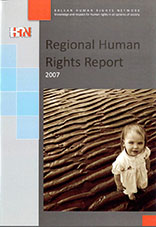Human Rights in Montenegro 2007
Human Rights in Montenegro 2007
Author(s): Aleksandar Saša ZekovićSubject(s): Law, Constitution, Jurisprudence
Published by: Balkan Human Rights Network
Summary/Abstract: In its second year since establishment as an independent, internationally recognized state, Montenegro progresses on its way to European integration. However, a special concern in view of respect for human rights in Montenegro is a climate of impunity surrounding controversial murders, war crimes, torture incidents, threats and physical assaults on NGO activists and journalists.There has been some progress towards improvement of the position of members of vulnerable social groups, but without satisfactory pace and effective results. Montenegro still does not have a comprehensive general anti-discrimination law, providing for effective suppression of and redress for discrimination. Elementary education has still not been provided for significant population of Roma children and not enough has been done to suppress a regular and massive school drop-off. Education in other minority languages apart from Albanian has not yet been provided. Children and students with disabilities still suffer exclusion from officially proclaimed inclusive education at all levels. In addition to the judiciary, Constitutional Court and the police, national human rights institutions exist in terms of Ombudsman, parliamentary committees for Human Rights, gender equality, defense and security, and the Council for the Civilian Control of the Police. Although the abilities and impact of those institutions vary, from the police and judiciary on rather negative side of the scale and the Ombudsman on a positive one, none deserved a title of an uncompromised promoter of human rights. Reform of the judicmry is on its way, judges are no longer to be appointed by the Parliament but by a Judicial Council. However, the appointment of prosecutors and Colllstitutional Court judges still waits to be disburdened from decisive majority vote of politicians. Judiciary is inefficient and largely ineffective in protection of human rights, as the focus ts still profoundly not pointed to that perspective. As women outnumber men, 10% of population lives with some form of a disability, 3% of inhabitants are Roma, app. 25,000 are refugees and IDPs, the state provided strategies for improvement of status of those vulnerable groups that remain profoundly discriminated. Sexual minorities remain publicly non-visible, out of fear from maltreatment. Montenegrin lively civil society, NGOs and media, played an important role in shifting the focus on the rule of law, combating corruption, impunity, discrimination, facing the recent war past and remain irreplaceable motors for strengthening the European and international human rights standards and values in contemporary Montenegro.
Journal: Regional Human Rights Report
- Issue Year: 2007
- Issue No: 01
- Page Range: 168-206
- Page Count: 39
- Language: English

